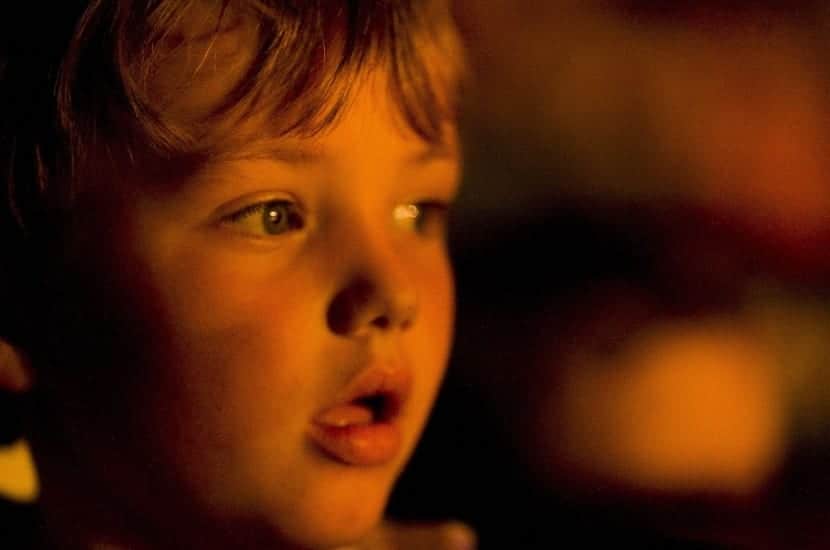
There are many mothers who often complain about the introversion of their children. Sometimes, and almost without meaning to, we tend to compare our character with that of our children, or we are amazed at how the brothers themselves differ from each other.
If there is something that we must be very clear about, it is that childish introversion is not a defect or a problem clinical to treat. We are talking about a personality trait like any other. And even more so, in recent years there has been a lot of talk about the "power of introverts" and how to enhance their talents. In "Madres hoy» We want to talk to you about this topic that will surely be of interest to you.
Introversion or shyness?

This is an aspect that we must make clear from the beginning: an introvert need not be shy, and in turn, shyness can lead tomorrow into some adaptation problem due to behavioral poverty in terms of social skills.
So, and to define both dimensions a little more, let's now see their differences.
The introverted child
- Introversion, as we have already indicated previously, is not related to shyness. So, you should see that in general, it relates quite well. He has friends and maintains the correct social norms.
- It has a strong and structured personality. They know what they like, what they don't want, they clearly show you their preferences and they don't hesitate.
- Introverted children they are usually very calm. They have their own rhythm, which is usually "somewhat slow", an aspect that many mothers and fathers complain about. (It takes a long time to get dressed, to tie shoes, to get up ...)
- They know how to listen, they take care of you.
- They are usually very imaginative, and thoughtful. You often see them "immersed in their world", in their toys, in their drawings ...
- In general, they are children who speak little. However, when they do, you realize that they have a good maturity for their age. They choose their words well and express themselves in a very correct way, sincere.
- They do not like to attract attention, they are not of those who have initiative. They work better alone than in a group.
The shy boy
- The shy child usually has relationship problems with others, both with strangers and with other children.
- He has a very low assertiveness, he is not one of those who knows how to tell you clearly what they want or what happens. They are usually somewhat dependent.
- They show some submission to a group of friends, and at home, you sometimes worry that he communicates so little to you or that he opens up very little about his tastes.
- There are days when you see certain emotional changes in them. They can cry for nothing or show a joy you don't know where it comes from.
- You tend to avoid many things that focus fears and anxieties. There are days when he does not want to go to school, and he will show it to you through stomach problems, nausea, feeling sick... These are moments when they come to somatize "their social fear", where shyness already borders on a clear problem capable of generating high anxiety.
Know and respect your introverted child

One of the aspects that usually generates more controversy at the family level is the incorrect idea that childhood introversion can generate social or personal problems in the child. Therefore, it is common for these misconceptions to avoid:
- Introversion is a personality problem.
- An introverted child is a child who does not know how to communicate.
- Must Help introverted children to be more outgoing.
- Compare the children of other friends with ours.
Introversion is a personality type that we must respect
Personality is a psychological construct that can undergo variations Over time, it builds on maturity and our personal experiences. Now, despite experiencing some own changes over time and personal learning, there is an essence that is stable and that we cannot change.
If our child is introverted, extroverted, if he is somewhat maniacal, carefree or somewhat meticulous, do not make it your goal to change him. Children should not be replicas of their parents. Our children are unique and we must enhance their maturity, independence and happiness whatever they are.
Do not compare it with other children nor with another sibling or relatives. Any comparison can be interpreted by the child with a focus of anxiety, or rejection.
Assume and accept their way of being. As mothers, we must offer them guidelines so that they feel integrated, so that they are autonomous, skillful and happy according to their personality and their personal characteristics.
The power of introversion

Introversion is in. Books like "The Power of Introverts" by Susan Cain, or "The Introvert Leader" by Jennifer B. Kanhweiler, outline a current recognition of a personality type that can offer much to today's society.
Until not long ago, the extroverted character was especially valued, there where to associate that profile with social and professional success. However, with the assessment of emotional intelligence and multiple intelligences, the power behind every introvert profile has been discovered.
We invite you to discover what strategies should we follow to educate our children, taking advantage of their personal virtues associated with this type of personality.
How to develop personal skills in introverted children
- Introverted children are more sensitive and introspective. Respect those moments when they prefer to be alone, offer them their times and spaces, but encourage dialogue with them. Don't let introversion turn into isolation.
- Introverted children often have an affinity for reading, or writing. Offer him means, discover new tastes like keeping a journal, sketchbooks ...
- It is quite possible that he does not like sports, group games, competition, summer camps. Seeks activities in which you can enhance your skills, like painting classes, music classes ...
- Introverted children are talented and they must find out what theirs is, what their path is. Your role is to suggest, guide and support. Never force them to do something they don't like.
- They are usually very autonomous, they like to learn things on their own. This, as mothers, forces us to supervise their actions in a very subtle way, without pressure, guiding indirectly and without exercising control.
- Connect with him every day. Despite the fact that they seem very autonomous, solvent children and that they especially like to be alone, they need a daily "connection" with us and with a social circle.
- Find a time each day to have a "deep" conversation with them. Get on their level, know the concerns that your son has at all times, showing a total openness to his words.
- Practice active listening, all this establishes an adequate confidence where you will always feel safe to undertake great things. Reach your dreams.
- Introverted personalities tend to get lost in confusion. If you or his siblings are very outgoing, he will feel self-conscious. Always respect him, let it shine and establish positive reinforcements whenever you can.
Allow your child to enhance their skills natural ones, those that introversion always encourages. Tomorrow you will surely become a person capable of achieving great things.